Do Vacuum Seal Storage Bags Ruin Clothes?

There seem to be as many myths as there are facts about your best options for storing clothes long term. Vacuum storage bags are no exception to this and they endure an interesting reputation for the place they hold in the world of closet organization and design. Let’s explore all those details and nuances so we can get to the facts at the heart of the matter: do vacuum seal bags ruin clothes?
What Are Vacuum Storage Bags?
Surprisingly, this question holds more philosophical weight than you’d think for what appears to be a pretty straightforward topic. Is it still a vacuum storage bag if all you did was stuff your things in a garbage bag and hoovered out the air? Well - technically, it fits the definition, but you definitely don’t want to try this hack if you actually care about protecting your clothes!
Proper vacuum-seal storage bags for clothes should be made of a material substantially more durable than the kind of trash bag you pick up while shopping. This is a slightly thicker, sturdier type of plastic in most cases, but you might find that less expensive brands aren’t offering much of an improvement on that trash bag hack.
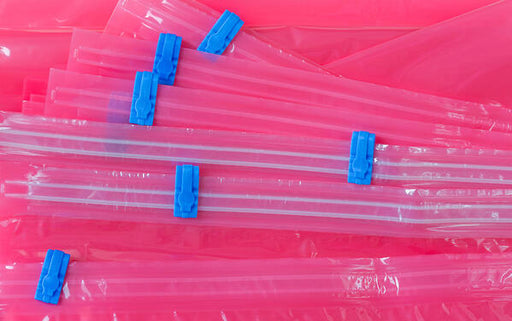
You’ll also encounter a variety of methods for removing the air from a storage bag. In this use, the term vacuum here refers to the absence of air in the bag - not the household appliance you might use to achieve that lack of air. So, you can find storage bags that you can fill with clothing, flatten and roll to push out air and create a vacuum seal.
Storage bags that do have a valve for use with a vacuum machine will feature a special zippered opening that allows you to fill the bag up with your garments. Either style can be found in a variety of sizes, but you’re more likely to find extra-large sizes in those with valves compared to roll-up style storage bags.
If you’re concerned about any impact that light exposure might have on your clothes while they’re in vacuum-sealed storage, you can choose brands that make bags from more opaque plastics. It stands to reason, of course that if anyone’s packing up clothes for vacuum-sealing, it’s not because they’ll be leaving them out in sunlight anywhere any time soon!
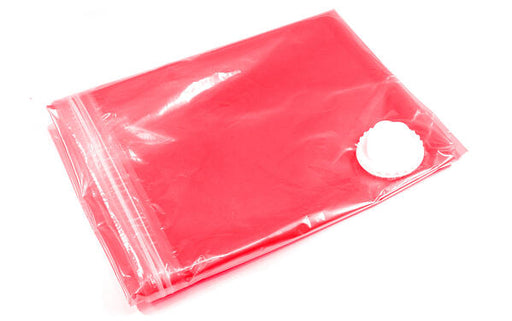
Why Use Vacuum Storage Bags?
When vacuum storage bags first showed up on the market, you can imagine they might be a pretty big hit. It’s hard to argue against the benefit of shrinking the space bulky clothes and linens took up all while protecting them from the elements. And, vacuum storage bags deliver on their promises more often than not. After all, using a household garbage bag may not be a great idea, but it’s an idea that still works - it’s not exactly rocket science, right?
The problems that come with using vacuum storage bags have to do with why people think they should be using them, and what they’re actually effective at doing. Here’s the thing - yes, sucking out all the air from around a bundle of clothing does shrink how much space they take up. And yes, a durable, completely sealed plastic covering absolutely protects textiles from external sources of damage.
But, what does that level of compression do to the individual fibers of each piece of fabric? And what happens to clothes that actually need to “breathe” in the first place if they’re left in storage like this for too long?
Well, if you’re storing a piece of cashmere or silk, that level of compression can damage those natural fibers permanently. In fact, you could be lucky to escape a long term vacuum-sealed storage debacle with just a few stubborn creases in some of your naturally made textiles and products. Leather is known for being tough and in some cases actually welcomes a bit of rough handling in order to season it and break it in, but compression can cause it to crack and wreak irrevocable damage.
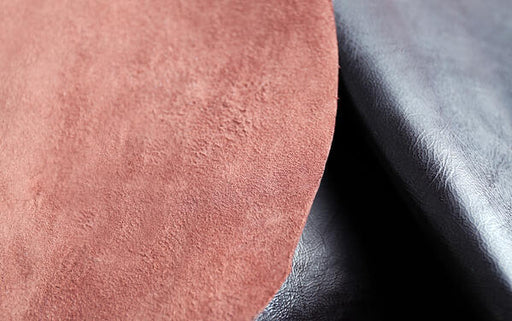
Answers like these might seem to prove without a doubt that you have more reasons to chuck vacuum storage bags out rather than make any sort of use of them, but they aren’t a bad choice for all types of clothing. Of the textiles made from natural fibers, plant-based ones tend to fare far better than animal-sourced fibers. Cotton and linen, although they wrinkle easily, can withstand enough of the heat and steam necessary for the fibers to straighten again.
The same holds true for many synthetic or synthetic blend fabrics (such as blended cashmere). But, keep in mind that while you might find wool blends that have a significant volume of synthetic material woven into them, thus making them more wrinkle-resistant than their 100% wool counterparts, they’re not guaranteed to stand up to long term vacuum storage.
It may seem counter-intuitive, but vacuum seal bags aren’t a good fit for big puffy items, like ski jackets or sleeping bags, even if they’re made of fibers that won’t break down under pressure. That’s because the air that’s caught between these fibers during the manufacturing process is necessary for all that stuff inside to get its fluff. It may surprise you how long it takes for the airy puffiness to return to items like that, if at all.
It’s worth considering vacuum seal storage bags as a solid choice for shorter periods of storage, however, even if some of those items are made of wool or silk. A good wash-and-dry afterward ought to release any wrinkles in most cases like these, just remember to unpack them and get that taken care of sooner than later to avoid any risk of damage!
How Do You Pack Clothes In A Vacuum Bag?
When you do choose vacuum storage bags for clothes, you’re better off choosing them to store a lot of clothing rather than those single, big pieces of clothing. And, they’re usually only worth all the trouble when you’re looking to take up as little space as possible due to moving or needing long term storage.
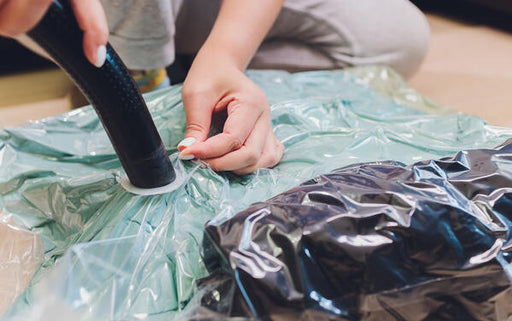
In any case, the basic steps behind packing items for storage in a vacuum-sealed bag are all the same:
- Step 1: Sort all the items you want to store together
- Step 2: Look over each item for necessary repairs and tend to them
- Step 3: Remove stains, thoroughly wash and fully dry according to each item’s care instructions
- Step 4: Fold or roll each item neatly; avoid stretching or twisting anything out of shape
- Step 5: Stack or store items together in as uniform a manner as possible
- Step 6: Follow manufacturer’s instructions for removing air from the vacuum bags
You may be wondering, how long do vacuum sealed bags last? Criticisms of plastic products center on the fact that they never biodegrade, or if they do, it’s only partially - but does that mean you can expect your vacuum-sealed clothing to last for an eternity? Sadly, no.
Plastic may not biodegrade, but it can melt due to heat or a reaction with another material, even the same kind of plastic. If you’ve ever used vacuum seal bags for long term storage before, you may be familiar with the sort of bond one plastic storage bag will make with its neighbor during the long, dark months of hibernation. If they’ve sat for too long and in too much heat, they can become so stuck together that peeling them apart rips them both open.
You can mitigate this dreadful phenomenon to some degree by following the usual rules of long term storage of any type of clothing - keep it climate-controlled as much as possible. If you’re particularly concerned about any adverse reactions between storage bags, you can slip some acid-free tissue paper between each bag to prevent it from getting too chummy with its neighbor.
Even clothes that can stand up to a long time under vacuum-sealed compression should be given some fresh air every now and then. Pencil it into your schedule alongside other big seasonal cleaning tasks, like airing out your natural fiber clothes from their less-restrictive but still vulnerable storage cycle. Extra steps like these can feel like they’re huge time-sinks, but you’ll be rewarding with longer-lasting textiles both natural and otherwise.

Do Vacuum Storage Bags Wrinkle Clothes?
Wrinkles are an inevitability when storing clothes in vacuum bags, so it’s better to understand how you can minimize the time it takes you to work the creases out of your clothing. A lot of this comes down to preparing your clothes for storage properly, but the type of vacuum bag you use can also play a role in how deeply creased you’ll find your clothes once you bring them up for air.
Not all vacuum storage bags and brands are created equal, there’s not always a clear-cut winner in the battle of the brands, but most trusted manufacturers know that consumers want as few wrinkles as possible when their clothes are in storage. A good strategy for minimizing the chance of huge wrinkles showing up in your clothes is to pick vacuum storage bags made of a thick plastic instead of thin - the stiffness of the bag means the bag itself will crinkle up less, which can help a little.
So much can still depend on how a person ends up using this type of storage - and how well they maintain it over time. While this doesn’t excuse brands from making a quality product that should stand up to the rigors of time, it does mean that how you use a vacuum storage bag can cause problems that no amount of quality manufacturing could prevent.
As long as you’re following the steps we shared above, you’re already doing as much as you can to keep your clothes wrinkle-free, but don’t be surprised when some show up, anyway. Instead, be prepared. Here are some easy-to-follow tips for getting stubborn wrinkles out of clothes that have been in long term, vacuum-sealed storage:
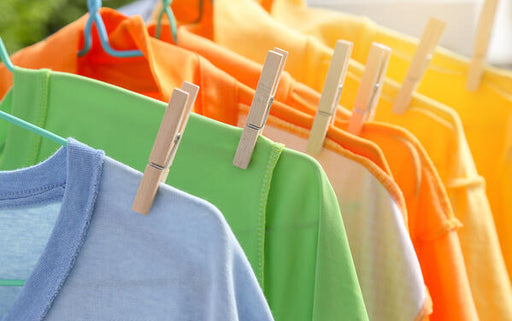
Check for damage on clothing that might have happened during storage
Wrinkles shouldn’t be your only worry. If you stick to conventional wisdom and leave the natural animal fiber textiles out of the vacuum-sealing storage process, you’re not as likely to deal with a clothes moth problem possibly showing up in your vacuum storage bags - but that doesn’t mean they or something else can’t create a problem that lurks in the dark of long term storage. Look for any signs of creepy-crawlies, and also check for pulled seams or broken buttons and other things like that. It's never a bad idea to have clothing moth traps hanging in your clothing storage areas - these may provide you with the first signs of clothes moths in your closet. Find out more about our odorless, non-toxic and refillable Clothes Moth Traps here.
Wash and dry everything immediately
Most wrinkles should work themselves out in the wash. If the care instructions allow for it, a good hot wash and dry can really do the trick. Saturation will already relax bent-up fibers for the most part, but the emulsified soaps and conditioners in most laundry detergents go one step beyond. For bonus wrinkle-releasing points, you can look for special spot-treatments and sprays to help you really smooth things out.
Hang or lay clothing flat to air everything out
More than anything, your wrinkled clothes need time to relax in order to release all those creases. Even if they’re smooth-looking, they might still seem a little lifeless and flat if they’ve been in a vacuum-sealed bag for a while. So long as they won’t be stretched out of shape by it, hang your items up with plenty of room to breathe or lay them out flat where they can stay undisturbed for a while.
Use an iron or iron-alternative for remaining creases
If you’re feeling particularly confident about how you want to handle your vacuum-sealed items, you may be tempted to skip to this step. Try to resist - unless you are facing an ultimate fashion emergency and need that one signature piece you’ve had in storage to save the day in a flash. Your garment’s care label, or your iron’s manual, will tell you which settings work best for that fabric type. When in doubt, you can try a steamer or other wrinkle-releasing tricks to get everything looking in top shape again.
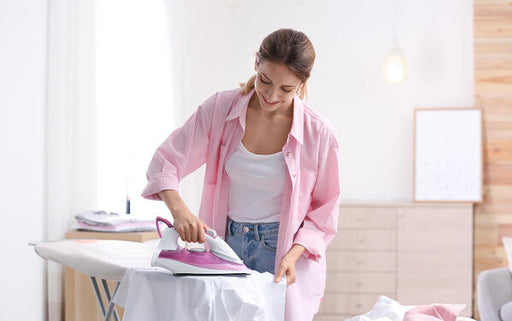
Now you know everything you need to consider for the answer to this often asked question, does vacuum packing clothes ruin them?
As you can see, it’s only certain types of clothes and fibers that are more prone to damage using this method, but most clothes will be affected if they’re vacuum-sealed for several months or more. The trouble is, vacuum storage bag brands typically market the product as a long-term storage solution that’s one-size-fits all, when the reality is that it depends a great deal on what type of clothes wind up in the bag.
Overall, your best bet is to use vacuum storage bags strategically rather than as a catch-all solution for long term storage of every type of clothing or household textile. Just remember that no matter what your clothes are made of, nothing should stay under that amount of pressure for more than a few months without a break for air!
Is it time to whip out your warm clothes for fall again? Check out our tips for fall wardrobe turnover and switching out your spring closet!
FAQs for 'Do Vacuum Seal Storage Bags Ruin Clothes?’
Now that you know the facts about vacuum sealing and storing your clothes, let's go over some questions that are frequently asked on the subject. That way, you will be able to easily take great care of your favorite outfits, linens, bedding, and more without having to worry about ruining anything.
Is it good to vacuum seal your clothes?
If you want to save space in your closet, vacuum sealer bags can be fantastic. With durable sealed plastic coverings that protect textiles from all kinds of damage, these bags can be a game changer. However, the compression induced by vacuum sealing your garments can actually damage certain materials. Silk and cashmere are particularly susceptible to harm. Also, leather items may be cracked by the compression of a vacuum seal bag. So, while these bags are great for synthetics, mixed material clothes, inexpensive items, and things like bedding and coats, high-quality natural materials like cashmere, wool, silk, and leather, can be permanently damaged if compressed for too long.
Can you use a regular vacuum to vacuum seal clothes?
Wondering if you have to buy a special type of vacuum bag sealer for clothes? It will depend on the type of vacuum seal bags you get. The good news is that most vacuum seal bags are designed to work with regular household vacuum hose attachments. So, you don't need some sort of special vacuum sealing apparatus to suck the air out of most plastic vacuum seal bags. As long as your vacuum can pull air through its hose, it can be used to remove the air from a plastic vacuum sealing bag’s valve. Just be sure to get a good seal when you are attaching the hose. If the hose isn't the same size as the seal on your vacuum bag, you may need to get creative. If your vacuum does not have a hose attachment, it will not work with vacuum seal bags.
How do you use vacuum sealer on clothes?
Vacuum sealers work by removing air from plastic bags and thus reducing the volume of any flexible items inside. This process can keep items safe from moisture, dust, and more. Plus, vacuum sealing items improves storage space. There are many different kinds of vacuum sealers to choose from. Some are used for food items while others are used for clothing or textiles. For clothing items, specific vacuum-sealed bags must be purchased. Then, a vacuuming device with a suction hose is used to remove the air from those bags and compress the garments within. Vacuum sealers designed for edible foodstuffs cannot be used to suck the air out of a garment bag unless they have a hose attachment.
What cannot be vacuum sealed?
Leather, silk, cashmere, thick wool garments, and any natural fiber materials that could be damaged by compression should not be vacuum sealed. This may include woven items, hemp, or items with feathers. Basically, if a garment should not be compressed or squashed, it should not go into a vacuum-sealing bag. Leather can also be cracked over time from the compression of vacuum storage. However, if you have items made of these materials that will not be damaged by compression, vacuum sealing them is likely fine. Proceed with caution and use common sense. Also, read any clothing labels or tags.
What can be used as vacuum sealer bags for clothes?
The best vacuum sealer bags for clothes will have valves designed to let air out when it is suctioned through a vacuum’s hose. They will also have airtight valves to prevent accidental re-inflation. Get properly sized garment bags specifically designed for the vacuum sealing process. If you use other kinds of plastic bags, air will begin seeping back in and everything will inflate again. This can be frustrating and inefficient. So, save yourself the trouble and just get the right bags from the start.
How to use vacuum sealer bags for clothes?
The best vacuum sealer for clothes will be straightforward to use. These devices usually come with instructions that vary from system to system. However, generally, to use a vacuum bag sealer for clothes, you will first carefully fold your clothes and place them in properly sized vacuum bags. Then, seal the bags and suck out the air until everything is flat and compressed. When the bags stop shrinking, you can stop sucking air and close the valve. Store everything in a safe place.
About MothPrevention
MothPrevention® speak to customers every day about their clothes moth issues - clothes moths are a species that are ever increasing and that can cause significant damage to clothes, carpets and other home textiles.
To date, we’ve helped over 250,000 customers deal with their moth problems. We have developed professional grade solutions including proprietary pheromones and trap design, not available from anybody else in the USA.





